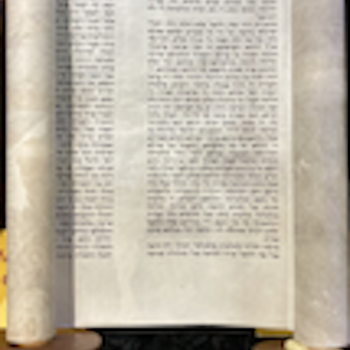 [See a prelude post to this post entitled “Jesus Cannot Return ‘Soon.’“]
[See a prelude post to this post entitled “Jesus Cannot Return ‘Soon.’“]
There is one Bible prophesy about the end times that pretribulationists cannot ignore in order to protect their doctrine of imminency, which means Jesus can return “at any moment” to rapture his church to heaven as the first of two stages of his second coming separated by seven years. Similarly, neither could Jesus have ever returned “soon,” as many Christians have thought.
If it can be shown from the Bible that Jesus must remain in heaven until the end of the great tribulation on earth, which must yet be at least decades away, that will prove pretribulationism to be a false doctrine. There is. In fact, there is a single word that King David wrote in a psalm that does that very thing. It is the Hebrew word ad, meaning “until.” From the Christian viewpoint, this text means that Jesus must remain in heaven “until” a very important prophecy is fulfilled, which will signal the end of the tribulation.
But by way of introduction, I need to explain that most Bible readers are unaware that in the final years of this age, before Jesus returns, there will be tremendous persecution of Christians by a person the Bible identifies as “the Antichrist” (1 John 2.18). The apostle Paul calls him “the lawless one” (1 Thessalonians 2.3, 9). He will have so many of God’s people put to death for refusing to worship him or his idol that Jesus once asked his disciples concerning his second coming, “when the Son of Man comes,” referring to himself, “will he find faith on earth?” (Luke 18.8). This question obviously requires a negative answer. It will be because so many people who had genuine faith in Jesus, to the extent that it really makes a difference in their lives, so they can honestly call Jesus “lord,” will have been martyred. It is important to understand this when reading about the intense wrath that God and Jesus will exhibit toward their enemies at the end of this age, when Jesus returns.
According to Ezekiel the prophet, at the end of the age the Antichrist, having the title “Gog,” will gather the nations’ armies to attack the nation of Israel and annihilate it (Ezekiel 38-39). We will now look into this starting with two of the most important psalms in the biblical psalter, both of which were written by King David.
David was a most courageous warrior-king, a poet, a musician, and a prophet of God. He was inspired by God’s Spirit to write half of the Bible’s psalter, thus seventy-five psalms. Because of all of these qualities, David was just the right person to pen the apocalyptic Psalm 2. Therein, he prophesied concerning the end of our age, “Why do the nations conspire, and the peoples plot in vain? The kings of the earth set themselves, and the rulers take counsel together, against the LORD and his anointed, saying, ‘Let us burst their bonds asunder, and cast their cords from us.’ He who sits in the heavens laughs; the LORD has them in derision. Then he will speak to them in his wrath, and terrify them in his fury, saying, ‘I have set my king on Zion, my holy hill’” (Ps 2.1-6 NRSV). Both Jews and Christians have regarded this as a messianic, royal psalm wherein “LORD” (=YHWH/yhwh) is the name of God and “anointed” refers to the “messiah.” From the Christian perspective, Psalm 2 describes the second coming of Christ.
Psalm 110 also was written by David. Its v. 1 is the most quoted Old Testament text in the New Testament. Psalm 110 begins, “The LORD says to my lord, ‘Sit at my right hand until I make your enemies your footstool.’ The LORD sends out from Zion your mighty scepter, Rule in the midst of your foes” (Ps 110.1-2).
The word “until” in Ps 110.1 translates ad in the Hebrew text (Masoretic Text). This word appears often in the Hebrew Bible (=Old Testament). Nearly always it is translated “until.” The authoritative resource New Brown-Driver-Briggs (p. 725) says of it, “In poetry, ad is sometimes used to mark not an absolute close, but an epoch, or a turning point, in the future, as in Psalm 110.1.” The second coming of Christ certainly will do that.
The noun “footstool” in Ps 110.1 translates hadom in the Hebrew text. B-D-B (p. 213) also says hadom is “properly something cast down, low—Yahweh absolutely in Psalm 110.1” It adds, “footstool, never literal, usually of Yahweh Is 66.1” [not my emphasis]. Indeed, Isaiah 66.1 reads, “Thus says the LORD: Heaven is my throne and the earth is my footstool.” So, “footstool” in Ps 110.1 likely is metaphorical as well, indicating God will cast down, in a low place, Jesus’ enemies at the end of our age to become his footstool to trample and destroy them.
We might ask, “how will Jesus do that?” Isaiah tells us, “he shall strike the earth with the rod of his mouth, and with the breath of his lips he shall kill the wicked” (Isaiah 11.4). In this case, it is surely to be understood literally since it is either quoted or alluded to multiple times in the New Testament without any indication that it is metaphorical (2 Thessalonians 2.8; Revelation 2.7; 12.5; 19.15).
The synoptics report that Jesus quoted Ps 110.1 to overcome his interlocutors (Mt 22.44; Mk 12.36; Lk 20.43). He did so by citing the LXX (3rd c. BCE translation of Old Testament) by saying, “until I put your enemies under your feet.” This LXX paraphrase of the MT represents an explanation of “footstool.”
The apostle Peter surely alluded to Ps 110.1 when he preached to Jews about “Jesus, who must remain in heaven until the time of universal restoration that God announced long ago through his holy prophets” (Ac 3.20-21). Notice the word “until,” both here and in Ps 110.1. It indicates that Jesus will not leave heaven until the time when God makes Jesus’ enemies a footstool for his feet, signifying he will destroy them and thereafter establish his worldwide kingdom.
The author of Hebrews alludes to Ps 110.1 by saying Jesus “sat down at the right hand of the Majesty on high” (Heb 1.3). The author soon quotes all of Ps 110.1 in Heb 1.13 and later explains concerning all of this text, “‘he sat down at the right hand of God,’ and since then has been waiting ‘until his enemies would be made a footstool for his feet’” (Heb 10.12-13).
But the New Testament never explains how God will make Jesus’ enemies a footstool, that is, to put them under his feet. Most Bible readers no doubt think God intended nothing specific about the identity of Jesus’ enemies or the time and location where this will happen. And Bible scholars rarely address this in their Bible commentaries or do so merely in a general sense. But specific answers can be discovered by piecing together certain end times biblical prophecies relating to this, like putting together pieces of a puzzle.
Zechariah predicts of the end time, saying on behalf of God, “For I will gather all the nations against Jerusalem to battle, . . . Then the LORD will go forth and fight against those nations . . . On that day his [Messiah’s] feet shall stand on the Mount of Olives” (Zech 14.2-4). Zion refers to the fortress of Zion that David captured (2 Sam 5.7). Located just outside East Jerusalem to the south, David lived there and named it “the city of David.” In the Bible, the concept of Zion is often extended to include Jerusalem if not more. So, at Jesus’ second coming, when he will descend from heaven and set foot on Mount Olivet, that will be God establishing his king on Zion.
The prophet Joel likewise proclaims on behalf of God in Joel 3.2, 9, 12, 14-16:
“I will gather all the nations and bring them down to the valley of Jehoshaphat, and I will enter into judgment with them there, on account of my people and my heritage Israel. . . . Proclaim war, stir up the warriors. Let all the soldiers draw near, let them come up. . . . Let the nations rouse themselves and come up to the valley of Jehoshaphat; for there I will sit to judge all the neighboring nations. . . . Multitudes, multitudes, in the valley of decision! For the day of the LORD is near in the valley of decision. The sun and the moon are darkened, and the stars withdraw their shining. The LORD roars from Zion, and utters his voice from Jerusalem.” What is this Valley of Jehoshaphat?
The Prophet Isaiah states, “Who is this splendidly robed, marching in his great might?” (Isaiah 63.1) The person addressed answers, “It is I, announcing vindication, mighty to save.” The inquirer asks again, “Why are your robes red, and your garments like theirs who tread the wine press?” (v. 2). The person answers, “I have trodden the wine press alone, and from the peoples [Gentiles] no one was with me; I trod them in my anger and trampled them in my wrath; their juice [blood] spattered on my garments, and stained my robes. For the day of vengeance was in my heart, and the year of my redeeming work had come. . . . I trampled down peoples in my anger, I crushed them in my wrath, and I poured out their lifeblood on the earth” (vv. 3-6). Both Christians and Jews have rightly believed that Isaiah 63 is messianic. American abolitionist and poet Julia Ward Howe wrote “The Battle Hymn of the Republic” based on this text.
John the Revelator relates that in a vision he had, “Then I looked, and there was a white cloud, and seated on the cloud was one like the Son of Man, with a golden crown on his head, and a sharp sickle in his hand!” (Revelation 14.14). “The Son of Man” is Jesus, which he often called himself. John further relates that an angel commanded another angel, “‘Use your sharp sickle and gather the clusters of the vine of the earth, for its grapes are ripe.’ So the angel swung his sickle over the earth and gathered the vintage of the earth, and he threw it into the great wine press of the wrath of God. And the wine press was trodden outside the city [Jerusalem], and the blood flowed from the wine press, as high as a horse’s bridle, for a distance of about two hundred miles” (vv. 18-20).
John adds, “Then I saw heaven opened, and there was a white horse! Its rider is called Faithful and True, and in righteousness he judges and makes war. . . . And the armies of heaven, wearing fine linen, white and pure, were following him on white horses. . . . he will tread the winepress of the fury of the wrath of God the Almighty. On his robe and on his thigh he has a name inscribed, ‘King of kings and Lord of lords’” (Revelation 19.11, 14-16).
All these texts depict Jesus at his second coming. Since the fourth century CE, Christians have identified Joel’s “Valley of Jehoshaphat” as the Kidron Valley. It is located next to Jerusalem’s Temple Mount, between it and the Mount of Olives. When Jesus first sets foot on the Mount of Olives at his second coming, he will look down upon his enemies gathered in the Kidron Valley. This valley probably was also named after Judah’s King Jehoshaphat since his name means “Yahweh judges.” This is where God will gather the bulk of the multitude of the nations’ armies in the last days as they invade the land of Israel and attempt to annihilate the nation. That is the meaning of the angel gathering the clusters of grapes, symbolizing the armed enemies of Jesus, and throwing them into the winepress. At that time, they will become Jesus’ footstool in the Kidron Valley as he comes from heaven to trod upon them in God’s wine press.
The author of Hebrews further says of Ps 110.1, “But when Christ had offered for all time a single sacrifice for sins, ‘he sat down at the right hand of God,’ and since then has been waiting ‘until his enemies would be made a footstool for his feet’” (Heb 10.12-13).
Thus, the word “until” in Ps 110.1 and these other quotations of it is most significant. It indicates Jesus will not vacate his seat on God’s throne and exit heaven until God gathers many of Jesus’ enemies, that is, the nations’ armies, into the Kidron Valley to become a footstool for Jesus’ feet. It will be the last biblical prophecy about conditions on earth that must be fulfilled before Jesus returns.
Jesus remaining in heaven until it is time for him to return to earth to destroy his enemies proves that pretribulationism–and any other teaching that says Jesus will return “at any moment” or “soon”–is a false doctrine. Consequently, this single word “until” in Psalm 110.1 should forever silence pretribulationists with their teaching called The Rapture. I think it is the strongest Bible text indicating the rapture before the tribulation is untrue. Instead, Jesus must remain in heaven until God makes Jesus’ enemies a footstool for his feet by gathering many of the nations armies into the Kidron Valley as the winepress. Then Jesus will return, his people will be raptured up into the sky to meet him, they will then go into the New Jerusalem hovering about the earth (Revelation 21), and Jesus will then continue his descent to land on Mount Olivet overseeing the Kidron Valley below.
[See my book, Warrior from Heaven, about Jesus’ second coming and the winepress.]













